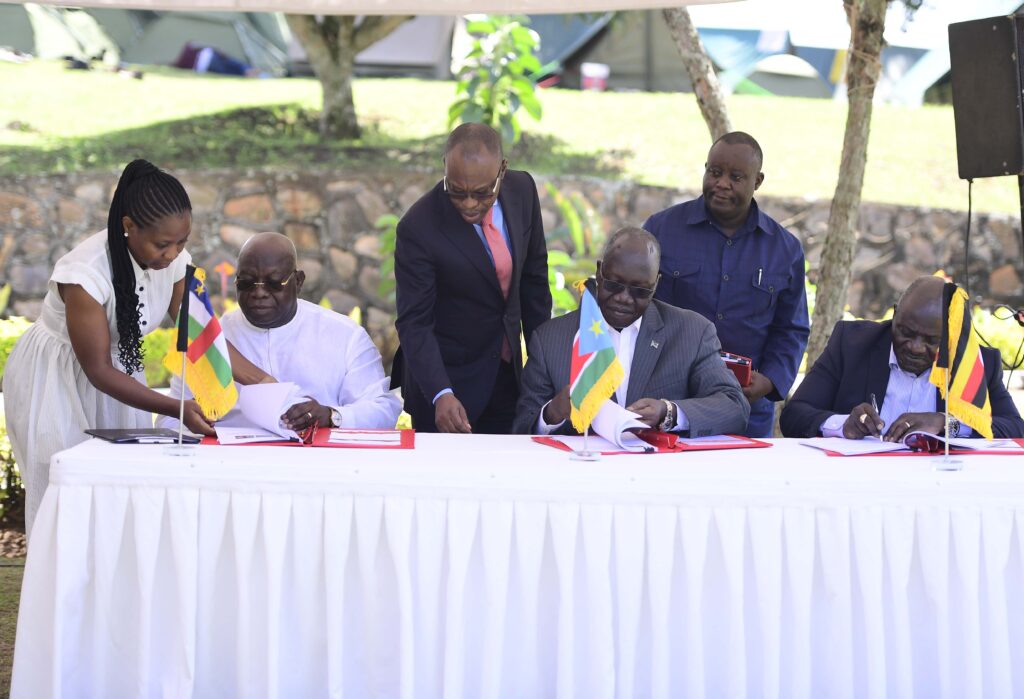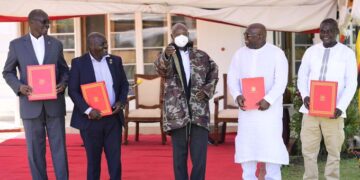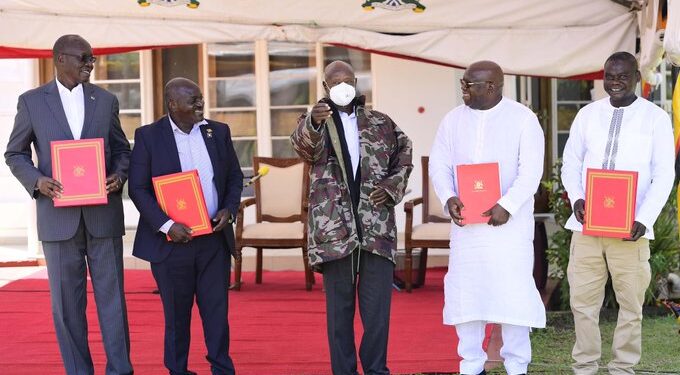His Excellency Yoweri Kaguta Museveni, President of the Republic of Uganda, convened a high-level Tripartite meeting at Fort Portal State Lodge on Friday with delegations from Uganda, South Sudan, and the Central African Republic.
“We launched a transformative 1,100 km Road Project to enhance connectivity and trade among our countries. We reviewed the Bangu-Kampala Road Infrastructure project and outlined key connection points. This is great news as we enhance our infrastructure, security, and aviation connectivity within the region,” said President Museveni on his X platform.
The primary objective of the meeting was to initiate preparations for a transformative 1,100-kilometre road infrastructure project intended to connect Uganda to the Central African Republic via South Sudan. The proposed road network will unlock new trade opportunities across the three countries, linking previously unconnected regions.
Delegates commended the Heads of State—President Museveni of Uganda, President Faustin-Archange Touadéra of the Central African Republic, and President Salva Kiir Mayardit of South Sudan—for their visionary leadership in tackling infrastructure and security challenges that have long hindered regional integration and development.
The Ministers reviewed progress made during the March 2025 bilateral talks on the Bangu-Kampala Road Infrastructure Project, which had been guided by Presidents Museveni and Touadéra. The discussions reaffirmed the shared goal of boosting regional trade through improved connectivity.

Consensus was reached on key connection routes for the road project. These include the Kampala–Karuma–Nimule–Juba–Kaya–Yeyi–Juba corridor linking Uganda and South Sudan, and a South Sudan–Central African Republic route passing through Juba–Mundri–Yambi–Yumbo–Ezo–Bambouti–Obo–Sibuti.
The project will be executed in phases: Phase I (short-term): Focuses on emergency roadworks, such as grading gravel roads and repairing critical bridges to improve immediate connectivity and Phase II (medium to long-term): Involves upgrading gravel roads to tarmac and rehabilitating existing paved roads to establish a sustainable trade corridor.
The delegations agreed to jointly mobilise funding for the long-term implementation of the project, recognising its strategic value for regional trade and security.
To spearhead the initiative, a Tripartite Technical Committee (TTC) was established. It comprises technical officials from the ministries responsible for Transport, Infrastructure, Public Works, Defence, Foreign Affairs, Internal Affairs, and the Solicitor General. The TTC will conduct joint inspections, finalise road alignments, complete feasibility studies, and develop an implementation framework.
On the sidelines of the meeting, Uganda and the Central African Republic signed a Bilateral Air Service Agreement (BASA) and a Memorandum of Understanding to enhance aviation connectivity. These agreements pave the way for Uganda Airlines to commence flights to the Central African Republic. Ministers instructed technical teams to expedite the implementation process, underscoring a shared commitment to regional integration, trade facilitation, mobility, and security cooperation.

The visiting Ministers from South Sudan and the Central African Republic expressed deep appreciation to President Museveni and the Government of Uganda for the warm hospitality and commitment to regional unity.
The meeting concluded with the signing of the Bilateral Air Service Agreement and a joint communiqué by the Ministers. President Museveni thanked the delegations for their dedication to advancing regional cooperation and pledged continued support for the initiative.
Notable attendees included: Hon. Gen. Katumba Wamala, Uganda’s Minister of Works and Transport, Hon. Simon Mijok Mijak, South Sudan’s Minister of Roads and Bridges, Hon. Eric Mathieu Rokosse-Kamot, Central African Republic’s Minister of Equipment and Public Works and Technical officials from key ministries in all three countries.
The next Tripartite meeting will be scheduled following the TTC’s inspection and planning activities, with dates to be confirmed through diplomatic channels.











